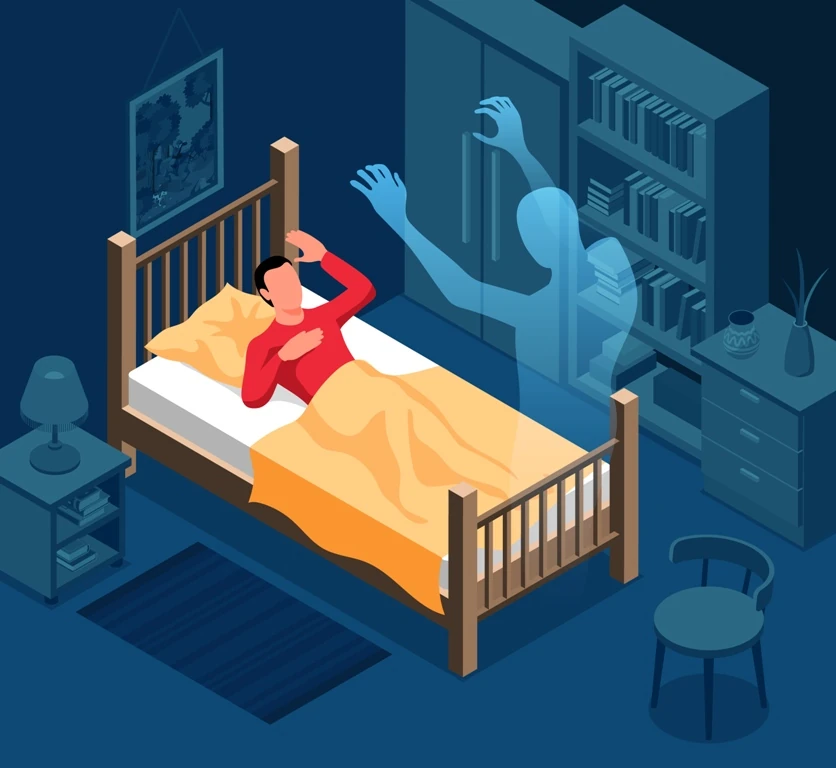What is Sleep Paralysis?
Sleep paralysis is a phenomenon characterized by a temporary inability to move or speak while falling asleep or waking up. During sleep paralysis, a person may find themselves conscious and aware of their surroundings, but they are unable to move their body or speak. This condition can be accompanied by a feeling of pressure on the chest, difficulty breathing, and hallucinations.
Sleep paralysis occurs when the transition between sleep stages is disrupted. Normally, as you fall asleep, your body goes through different sleep stages, including REM (rapid eye movement) sleep, where most dreaming occurs. During REM sleep, your brain sends signals to temporarily paralyze your voluntary muscles, preventing you from acting out your dreams. In sleep paralysis, this paralysis persists for a brief period even as you become conscious or are waking up.
While sleep paralysis is a relatively common phenomenon, it can be a frightening experience for those who go through it. It is often associated with other sleep disorders, such as narcolepsy, and can be triggered by factors like sleep deprivation, irregular sleep patterns, and stress. Most episodes of sleep paralysis are harmless and typically last for a few seconds to a couple of minutes.
If someone experiences frequent or severe episodes of sleep paralysis, it’s advisable to consult with a healthcare professional or a sleep specialist to explore potential underlying causes and discuss possible interventions.

What are the symptoms of Sleep Paralysis?
Sleep paralysis is characterized by several distinctive symptoms, which can vary from person to person. The key features of sleep paralysis include:
Inability to Move:
During an episode of sleep paralysis, individuals are temporarily unable to move their voluntary muscles. This can include the limbs, torso, and facial muscles.
Difficulty Speaking or Screaming:
People experiencing sleep paralysis often find it challenging to speak or make any noise. Attempts to call out for help may be met with difficulty, and the vocalizations may be limited or unintelligible.
Awareness of Surroundings:
Despite the inability to move, individuals remain conscious and aware of their environment. They may be able to perceive sounds and see their surroundings.
Sensations of Pressure or Weight on the Chest:
Some people report a sensation of pressure or a feeling of heaviness on their chest during sleep paralysis. This can contribute to a sense of breathlessness or difficulty breathing.
Hallucinations:
Hallucinations are common during sleep paralysis. These can take various forms, including visual, auditory, or tactile hallucinations. Individuals may report seeing shadowy figures, hearing strange noises, or feeling a presence in the room.
Fear and Anxiety:
Due to the unusual and sometimes frightening nature of the experience, feelings of fear and anxiety are often associated with sleep paralysis.
Short Duration:
Episodes of sleep paralysis typically last for a short duration, ranging from a few seconds to a couple of minutes. While the experience can be intense, it is usually transient.
It’s important to note that while sleep paralysis can be a standalone phenomenon, it is also associated with various sleep disorders, such as narcolepsy. If someone experiences persistent or recurrent episodes of sleep paralysis, especially if accompanied by other sleep-related symptoms, it is advisable to consult with a healthcare professional or a sleep specialist for further evaluation and guidance.
Causes of Sleep Paralysis
Sleep paralysis can occur for various reasons, and its exact cause is not always clear. However, several factors and conditions are associated with an increased likelihood of experiencing sleep paralysis. Some common causes and contributing factors include:
Disruption of Sleep Patterns:
Irregular sleep patterns, such as frequent changes in sleep schedule or inadequate sleep, can contribute to the occurrence of sleep paralysis.
Sleep Deprivation:
Lack of sufficient sleep or chronic sleep deprivation can increase the likelihood of experiencing sleep paralysis.
Sleep Disorders:
Sleep paralysis is often associated with other sleep disorders, such as narcolepsy, a condition characterized by excessive daytime sleepiness and sudden episodes of muscle weakness or paralysis.
Irregular Sleep-Wake Cycle:
Shift work, irregular work hours, or inconsistent sleep-wake cycles can disrupt the natural sleep patterns and increase the risk of sleep paralysis.
Sleeping on the Back:
Some studies suggest that sleeping in a supine (on the back) position may be associated with a higher incidence of sleep paralysis episodes.
Family History:
There may be a genetic component to sleep paralysis, as a family history of the condition can increase the likelihood of experiencing it.
Stress and Anxiety:
High levels of stress and anxiety, both in daily life and specifically related to sleep, can contribute to the occurrence of sleep paralysis episodes.
Sleep-Related Leg Cramps:
Conditions that cause leg cramps or discomfort during sleep may contribute to disruptions in sleep and increase the risk of sleep paralysis.
Substance Use:
The use of certain substances, such as stimulants or alcohol, can affect sleep patterns and potentially contribute to sleep paralysis.
Other Sleep-Related Conditions:
Conditions like insomnia, sleep apnea, and restless legs syndrome have been linked to an increased risk of sleep paralysis.
It’s important to note that while these factors are associated with sleep paralysis, the exact mechanisms and interactions leading to sleep paralysis episodes are not fully understood. If someone experiences recurrent or severe sleep paralysis episodes, it is advisable to consult with a healthcare professional or a sleep specialist for a thorough evaluation and appropriate guidance.
Is Sleep Paralysis dangerous?
In general, sleep paralysis itself is not considered dangerous, and the episodes are typically harmless. While the experience can be frightening and unsettling, it does not cause physical harm. Most episodes of sleep paralysis last for a short duration, ranging from a few seconds to a couple of minutes.
However, the psychological impact of sleep paralysis can be significant. The vivid hallucinations, the sensation of being unable to move or speak, and the associated fear and anxiety can lead to distress and disrupt a person’s overall well-being. Recurrent or severe episodes of sleep paralysis may interfere with sleep quality and contribute to sleep-related disorders or conditions like insomnia.
It’s important to differentiate sleep paralysis from other sleep disorders that may be associated with it, such as narcolepsy. Narcolepsy is a neurological disorder characterized by excessive daytime sleepiness, sudden episodes of muscle weakness (cataplexy), and, in some cases, sleep paralysis. If sleep paralysis is part of a broader pattern of sleep disturbances or if it significantly impacts daily functioning, it is advisable to seek guidance from a healthcare professional or a sleep specialist.
Additionally, addressing underlying factors contributing to sleep paralysis, such as improving sleep hygiene, managing stress, and addressing any coexisting sleep disorders, can be beneficial in reducing the frequency of episodes. If you have concerns about your sleep or experience persistent sleep-related issues, consulting with a healthcare professional can help determine the appropriate course of action for your specific situation.
Treatment of Sleep Paralysis
The treatment of sleep paralysis depends on the underlying causes and associated factors. In many cases, adopting healthy sleep habits and addressing lifestyle factors can help reduce the frequency of episodes. Here are some general approaches and recommendations for managing sleep paralysis:
Improve Sleep Hygiene:
- Establish a regular sleep schedule by going to bed and waking up at the same time each day.
- Create a relaxing bedtime routine to signal to your body that it’s time to wind down.
- Ensure your sleep environment is comfortable, dark, and quiet.
Address Sleep Disorders:
- If sleep paralysis is associated with other sleep disorders like narcolepsy, addressing the underlying condition may help alleviate symptoms. Consult with a sleep specialist for a comprehensive evaluation.
Reduce Stress and Anxiety:
- Practice stress-reduction techniques such as mindfulness, meditation, deep breathing exercises, or yoga.
- Identify and manage sources of stress in your life.
Improve Sleep Position:
- Some individuals find that changing their sleep position, such as avoiding sleeping on their back, can reduce the occurrence of sleep paralysis episodes.
Ensure Adequate Sleep:
- Aim for the recommended amount of sleep for your age group. Most adults need 7-9 hours of sleep per night.
Limit Stimulant Intake:
- Reduce or eliminate the consumption of stimulants such as caffeine and nicotine, particularly in the hours leading up to bedtime.
Regular Exercise:
- Engage in regular physical activity, but avoid intense exercise close to bedtime.
Create a Comfortable Sleep Environment:
- Ensure your bedroom is conducive to sleep by maintaining a comfortable temperature, reducing noise, and minimizing light exposure.
Cognitive-Behavioral Therapy (CBT):
- CBT for insomnia may be beneficial in addressing any anxiety or negative thought patterns associated with sleep paralysis.
Medication (in certain cases):
- In severe cases or when associated with other sleep disorders, medication may be prescribed. This is typically determined on a case-by-case basis and should be discussed with a healthcare professional.
It’s important to note that while these strategies may help reduce the frequency of sleep paralysis episodes, they may not eliminate the phenomenon entirely. If you continue to experience sleep paralysis or if it significantly impacts your well-being, it is advisable to consult with a healthcare professional or a sleep specialist for a thorough evaluation and personalized recommendations.
How can we prevent from Sleep Paralysis?
While it may not be possible to completely prevent sleep paralysis, adopting certain lifestyle and sleep hygiene practices can help reduce the likelihood of experiencing episodes. Here are some tips to help minimize the occurrence of sleep paralysis:
Maintain a Consistent Sleep Schedule:
Go to bed and wake up at the same time every day, even on weekends. Consistency helps regulate your body’s internal clock.
Create a Relaxing Bedtime Routine:
Establish a calming routine before bedtime to signal to your body that it’s time to wind down. This may include activities such as reading, taking a warm bath, or practicing relaxation techniques.
Optimize Your Sleep Environment:
Make your bedroom conducive to sleep by keeping it dark, quiet, and cool. Consider using blackout curtains, earplugs, or a white noise machine if needed.
Avoid Stimulants Before Bed:
Limit the consumption of caffeine and nicotine, especially in the hours leading up to bedtime.
Limit Electronic Devices:
Reduce exposure to screens (phones, tablets, computers) at least an hour before bedtime, as the blue light emitted can interfere with the production of the sleep hormone melatonin.
Exercise Regularly:
Engage in regular physical activity, but try to avoid vigorous exercise close to bedtime. Regular exercise can promote overall sleep quality.
Mindfulness and Relaxation Techniques:
Practice mindfulness meditation, deep breathing exercises, or progressive muscle relaxation to manage stress and anxiety.
Sleep Position:
Experiment with different sleep positions, as some people find that avoiding sleeping on their back reduces the likelihood of sleep paralysis episodes.
Address Underlying Sleep Disorders:
If you suspect you have an underlying sleep disorder, such as insomnia or sleep apnea, seek evaluation and treatment from a healthcare professional or a sleep specialist.
Manage Stress:
Identify and manage sources of stress in your life through techniques such as journaling, talking to a friend or counselor, or participating in stress-reducing activities.
It’s essential to note that individual experiences with sleep paralysis may vary, and what works for one person may not work for another. If you continue to experience sleep paralysis despite adopting these strategies, or if the episodes are causing significant distress, it is advisable to consult with a healthcare professional or a sleep specialist for personalized guidance and further evaluation.










